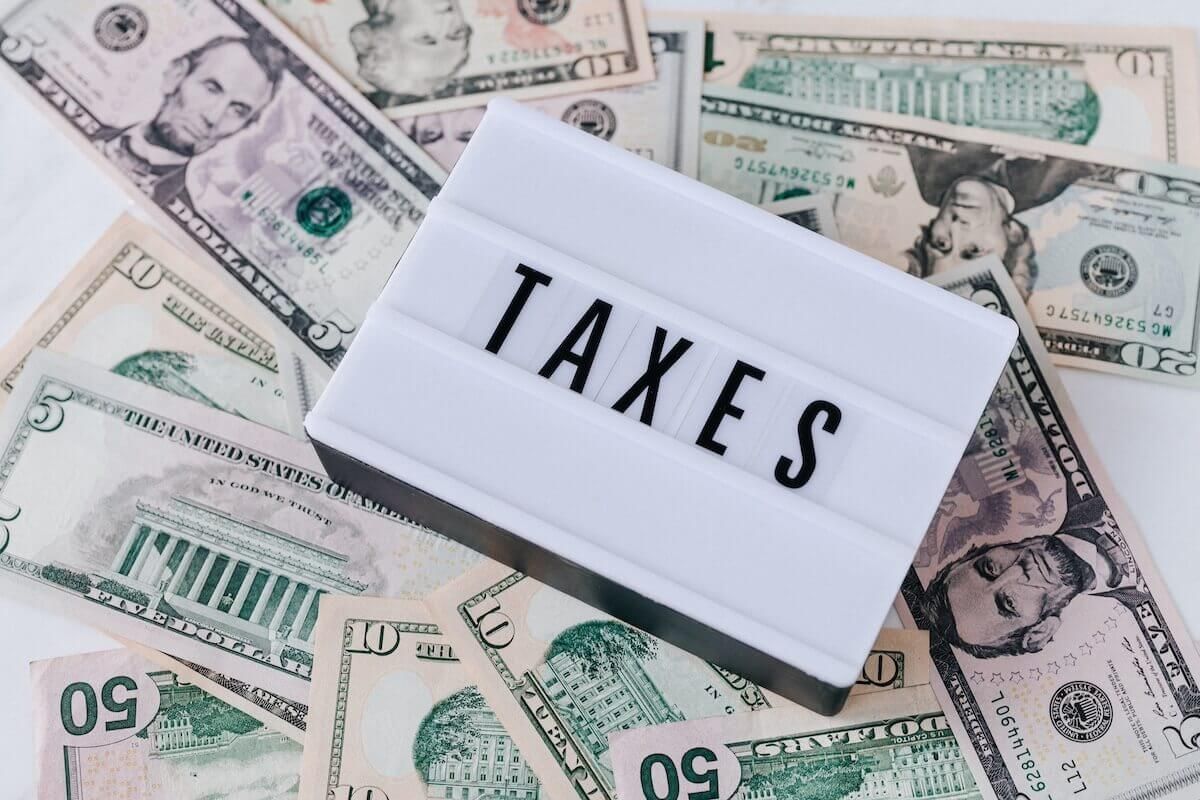Advertiser Disclosure
Last update: June 11, 2025
7 minutes read
Do College Students Have to Pay Taxes on FAFSA Grants?
Is financial aid taxable? Learn which FAFSA grants and scholarships stay tax-free, how to claim the American Opportunity and Lifetime Learning credits, and step-by-step tips for accurate reporting.

By Brian Flaherty, B.A. Economics
Edited by Rachel Lauren, B.A. in Business and Political Economy
Learn more about our editorial standards



By Brian Flaherty, B.A. Economics
Edited by Rachel Lauren, B.A. in Business and Political Economy
Learn more about our editorial standards
Navigating the world of FAFSA grants and taxes can feel like decoding a secret language. You might be asking, "Is FAFSA taxable?", or "Does FAFSA affect taxes?"
In this post, you’ll get clear, step-by-step guidance on how to pair your grants with powerful education tax credits and report them correctly, so you can focus on your studies—not your tax form.

Key takeaways
- FAFSA grants are typically non-taxable as they don't have to be repaid
- Grants become taxable if spent on non-qualified, non-educational expenses, or exceed your tuition amount
- While student loans and work-study income also impact your taxes, they're handled differently
Are FAFSA grants taxable?
First things first - there’s really no such thing as a “FAFSA grant.” The phrase is just a shorthand way to refer to the education grants distributed by the Federal government, which you’ll need to complete the FAFSA to be eligible for.
You’ll be relieved to know that Federal grants are not taxable. Since these grants are needs-based and typically don't require repayment, the IRS considers them non-taxable income.
What is FAFSA, and how does it impact taxes?
The Free Application for Federal Student Aid (FAFSA) is a yearly form college students complete to determine eligibility for financial aid. The U.S. Department of Education uses FAFSA to figure out your Expected Family Contribution (EFC), essentially an estimate of how much you can afford to pay, and therefore, how much monetary help you need. Most need-based grant or loan programs will require a copy of your FAFSA.
How different types of financial aid affect taxes
Now that we've got the FAFSA basics down, it's time to dive into different forms of financial aid and how they affect your taxes. Here's a quick breakdown:
- Student loans: As these need to be repaid to the lender, student loans aren't considered a source of income, and therefore aren't taxable. Not only that, but you may even be able to claim interest as a deduction against your income to reduce your tax bill.
- Grants and scholarships: Also known as the "free money" of education, grants, and scholarships don’t require repayment. As long as the funds are used on qualified education expenses, they’re typically not included as taxable income. But if you spend these funds on unauthorized expenses, be ready to face some tax consequences.
- Work-study programs: These are part-time, on-campus jobs offered to students to reduce tuition costs, and yes, this income is taxable and should be reported on a federal tax return.
Deep dive into grants and scholarships
Both grants and scholarships are typically non-taxable as long as they’re used for education expenses. Grants are typically needs-based, while scholarships are usually merit-based.
Here are some common expenses:
- Tuition
- Books
- Fees
- Supplies
- Equipment

TuitionHero Tip
Remember, using these funds for expenses not listed above could make them taxable.

Education tax credits: A powerful complement to FAFSA grants
While FAFSA grants themselves aren’t taxable, you shouldn’t overlook two education tax credits that can further shrink your out-of-pocket costs:
- American Opportunity Credit (AOC)
- Up to $2,500 per student, per year for the first four years of post-secondary education
- 100% of the first $2,000 of qualified expenses, plus 25% of the next $2,000
- Refundable: up to $1,000 can come back to you even if you owe no tax
- Claimed on Form 8863, reported on Schedule 3 of Form 1040
- Lifetime Learning Credit (LLC)
- Up to $2,000 per tax return for undergraduate, graduate, and professional courses
- Covers 20% of the first $10,000 of eligible expenses
- Non-refundable, but can reduce your tax liability to zero
- Also claimed on Form 8863

TuitionHero Tip
You can’t claim both credits in the same year for the same student—choose the one that maximizes your savings based on your qualified expenses and income.
What about student work-study programs?
If you're part of a work-study program, it's important to remember that this income is taxable. If you earn more than the standard deduction for the tax year, you'll need to file a tax return. So, don't overlook this in your tax planning.
Which tax return do you need for FAFSA?
Filing your FAFSA application requires you to be an early bird. Applications for the coming school year typically open in October of the previous year, but not always.
For instance, the application for the 2024-2025 school year will be available in December 2023, and it will require your 2022 tax information. By planning ahead, you can ensure a smoother application process and better financial aid chances.
Remember, at TuitionHero, we’re here to help you. With careful planning and understanding of how your financial aid can affect your taxes, you can keep the focus on your education – where it belongs!
Compare private student loans now
TuitionHero simplifies your student loan decision, with multiple top loans side-by-side.
Compare Rates
How to report FAFSA grants on your tax return: Step-by-step
Even though most federal grants are non-taxable, you still need to document them correctly and clear up concerns like "Is FAFSA taxed?":
- Gather Form 1098-T
- Issued by January 31
- Box 5 shows total scholarships and grants received; Box 1 shows payments received or billed for qualified tuition and related expenses
- Calculate the taxable portion: If grants exceed your Box 1 amount, or you used funds for room & board, the excess is taxable
- Enter on Form 1040
- Non-taxable grants: no entry needed—keep the 1098-T with your records
- Taxable portion: report on Schedule 1, Line 8z (“Other income”)
- Attach Schedule 1 to your Form 1040 and carry the total to Line 10 of your 1040
- Double-check state rules: Some states (e.g., California, New York) may require you to report or adjust federal grant amounts differently on your state return
Dos and don'ts of FAFSA grants
Though navigating the FAFSA landscape can be a bit of a challenge, some do’s and don'ts can keep you on the right path and help you make the most of your financial aid. Here's a table summarizing the key points:
Do
Do report FAFSA grants on your tax return.
Do use FAFSA grants for qualified educational expenses.
Do keep records and receipts.
Do seek professional advice.
Don't
Don't assume all financial aid is taxable.
Don't use FAFSA grants for non-educational purposes.
Don't ignore tax regulations.
Don't panic if unsure.
Advantages and disadvantages of FAFSA grants
Grants can prove to be a lifesaver for many students. However, like any financial tool, they come with both upsides and downsides.
- They don't need to be repaid, easing the financial strain on students.
- They’re not usually taxable unless they're misused.
- They provide a lot of financial aid, particularly for people who show significant financial need.
- Misuse of funds, such as spending on non-educational expenses, can make them taxable.
- Navigating through the application process may be complex for some people.
- Not all students will qualify for the grants, limiting their overall reach.
2025–26 FAFSA release and streamlined form
In late 2024, the 2025–26 FAFSA form was released on December 1, 2024—two months later than the traditional October 1 date—to address technical issues and improve usability for applicants .
At the same time, the online form was streamlined, cutting its length from 108 questions down to 46, and aligning many items directly with federal income tax returns to reduce data‐entry errors .

Why trust TuitionHero
At TuitionHero, we believe education should be accessible to everyone. We offer Private Student Loans, Student Loan Refinancing, Scholarships, FAFSA Assistance, and Credit Card Offers. Our comprehensive FAFSA guide helps you understand college finance, FAFSA grants, and their tax implications. We provide the knowledge and tools you need to navigate financial aid confidently.
Frequently asked questions (FAQ)
If you accidentally spend your FAFSA grant on non-qualified expenses, it might be counted as taxable income. It's important to keep a record of where your grant money is going or consult a financial advisor or TuitionHero to avoid mistakes like these.
Yes, you can. If you find your FAFSA grant isn’t enough, you can submit a financial aid appeal letter to your school's financial aid office explaining why you need more help.
Intentionally providing false information on your FAFSA application can lead to heavy penalties, including fines and jail time. Always make sure the information on your FAFSA application is accurate to avoid any legal implications.
You have “excess” financial aid when your total awards for the term exceed your school-approved cost of attendance. Here’s how it typically works:
- School charges first: Your college applies grants, scholarships, and loans to tuition, fees, and on-campus housing costs.
- Remaining balance: If aid still remains after those charges, the school issues you a refund—often via direct deposit or a check.
- Timing: Refunds usually occur shortly after the add/drop period ends for the semester. Check your school’s academic calendar or bursar’s office for exact dates.
No—provided you use them for qualified education expenses like tuition, fees, books, and required supplies. Any portion spent on non-qualifying expenses (room and board, travel, personal costs) is taxable and must be reported as “Other income” on Schedule 1, Line 8z of your Form 1040.
Final thoughts
By leveraging the right credits and following a clear reporting process, you’ll know that "Is FAFSA money taxable?" only applies when you misuse funds, not when you stick to tuition and fees.
Don’t let a simple typo make you wonder, "Is FAFSA taxable?"—and rest easy now that you understand whether FAFSA is taxable income. Keep good records, choose the credit that fits your situation, and tackle your tax return with confidence—so you can get back to what really matters: your education.
Source
Author

Brian Flaherty
Brian is a graduate of the University of Virginia where he earned a B.A. in Economics. After graduation, Brian spent four years working at a wealth management firm advising high-net-worth investors and institutions. During his time there, he passed the rigorous Series 65 exam and rose to a high-level strategy position.
Editor

Rachel Lauren
Rachel Lauren is the co-founder and COO of Debbie, a tech startup that offers an app to help people pay off their credit card debt for good through rewards and behavioral psychology. She was previously a venture capital investor at BDMI, as well as an equity research analyst at Credit Suisse.
At TuitionHero, we're not just passionate about our work - we take immense pride in it. Our dedicated team of writers diligently follows strict editorial standards, ensuring that every piece of content we publish is accurate, current, and highly valuable. We don't just strive for quality; we aim for excellence.
Related posts
While you're at it, here are some other college finance-related blog posts you might be interested in.
Shop and compare student financing options - 100% free!

Always free, always fast
TuitionHero is 100% free to use. Here, you can instantly view and compare multiple top lenders side-by-side.

Won’t affect credit score
Don’t worry – checking your rates with TuitionHero never impacts your credit score!

Safe and secure
We take your information's security seriously. We apply industry best practices to ensure your data is safe.
Finished scrolling? Start saving & find your private student loan rate today
Compare Personalized Rates




